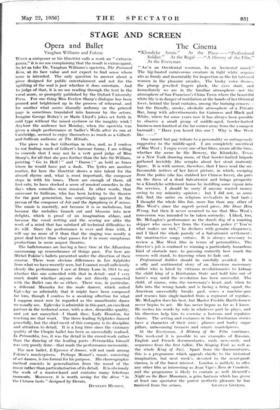The Cinema
"Klondyke Annie." At the Plaza "Professional Soldier." At the Regal —"A History of the Film." At the Everyman " AH'M an Occidental woonum, In an Awriental mood." The big-busted carnivorous creature in tight white sequins sits as firmly and inscrutably for inspection as the fat tattooed women in the pleasure arcades. The husky voice drones, the plump jewelled fingers pluck, the eyes slant, and immediately we are in the familiar atmosphere—not the atmosphere of San Francisco's China Town where the beaut iful white lily is in danger of mutilation at the hands of her Oriental lover, behind the bead curtains, among the burning censers -- but the friendly, smoky, alcoholic atmosphere of a Private Bar, hung with advertisements for Guinness and Black and White, where for some years now it has always been possible to observe a small group of middle-aged, bowler-hatted business men knotted at the far corner away from the youngest barmaid : " Have you heard this one ? Why is Mae West like —" One cannot but pay tribute to a personality so outrageously suggestive to the middle-aged. I am completely uncritical of Mac West ; I enjoy every one of her films, aware all the time, whether the scene be the Bowery, the Klondyke, Texas or a New York drawing room, of that bowler-hatted brigade gathered invisibly like seraphs about her stout matronly figure. It is with sorrow, therefore, that I have read the un- favourable notices of her latest picture, in which, escaping from the police (she has stabbed her Chinese lover), she puts on the dress of a dead Salvationist and brings prosperity to a Klondyke settlement house by instilling sonic vigour into the services. I should be sorry if anyone wasted money owing to my minority opinion ; but I did not, as sonic did, find the satire on religious revivalists in bad taste ; I thought the whole film fun, more fun than any other of Miss West's since the superb period piece, She hone Him Wrong, but then it never occurred to me that Miss West's conversion was intended to be taken seriously. I liked, too, Mr. McLaglen's performance as the dumb dog of a coasting skipper who saves her from the Canadian police (" You're what makes me tick," he declares with genuine eloquence), and I liked the whole parody of a Salvationist settlement : the unattractive soapy virtues. It is always necessary to review a Mae West film in terms of personalities. The director's job is confined to winning a particularly hazardous kind of obstacle race, to guessing correctly how much the censors will stand, to knowing when to fade out.
Professional Soldier should be carefully avoided. It is a silly and sentimental story of an American mercenary Soldier who is hired by virtuous revolutionaries to kidnap the child king of a Ruritanian State and hold him out of harm's way until the revolution has been successful. The &did, of course, wins the mercenary's heart, and, when he
falls into the wrong hands and is facing a firing squad, the American successfully breaks gaol, seizes a machine-glut and rescues him single-handed from a regiment of regulars.
Mr. McLaglen does his best, but Master Freddie Bartholomew never begins to act. He has never begun as far as I know. He recites his words by rote in whatever part he plays, and his directors help him to exercise a lustrous and repulsive charm. The setting and costumes in these Ruritanian stories have a character of their own : plumes and barley sugar pillars, unbecoming trousers and ornate mantelpieces.
At the Everyman, A History of the Film continues. This week-end it is possible to see examples of Russian,
English and French documentaries, early news-reels, and
sequences from the first talkie, The Singing Fool, as well as the whole King of .Jazz. Apart from the documentaries,
this is a programme which appeals chiefly to the historical
imagination, but next week's. devoted to the avant-garde cinema, is of the finest interest. London is unlikely to offer any other film as interesting as Jean 'Vigo's Zero de Conduite, and the programme is likely to contain as well Alexeieffs Night on the Bare Mountain, a grim fantasia which has given at least one spectator the purest aesthetic pleasure he has


















































 Previous page
Previous page